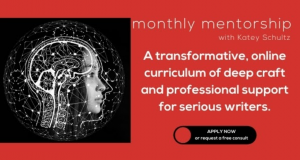Not Enough Time to Write

I recently received the following question during a consult with a writer interested in Monthly Mentorship: I don’t have enough time in the day to consistently write and I feel weighed down by obligation fatigue and my own writing goals. Can your program help me move past this?
A resounding yes! In Monthly Mentorship, I will help you to become intimate with your own process as a writer. Rather than work against tendencies such as overwriting, underwriting, never finishing, or confusion about where/how to begin revising, I teach writers how to work with where they naturally start, then spot their own unsuccessful forays and apply effective tools to get back on track with a light touch. My goal is to help you bring more joy, value, and pleasure to writing, and unburden you from “to-do” lists and impossible word counts.
All writers have their own versions of helpful and not-so-helpful thinking patterns, and a common denominator in all cases has to do with how to hold yourself accountable. Nothing about accountability is easy. But I’d be doing writers a disservice if I worked with them and accountability still felt like a big beast in the room.
The unique approach to accountability in Monthly Mentorship gently but effectively coaxes writers to form healthy habits of their own, both in terms of “productivity” and the less tangible, imaginative decision-making that goes on in the mind. Within a few months, writers in this program find a system that works for their current situation and goals. Also, the four key components that structure each month have accountability build in, and assigned partnerships between Mentees add a surprisingly effective (and often life-long) framework for success.
For instance, sometimes partners in the Mentorship program decide to swap 10-15 pages a month with each other, on their own, and give feedback. Other partners have opted for a weekly Sunday evening check in, and a once a month full day of writing. My question is always: what will work for you, or you and your partner, right now? And how can I, as facilitator of this program, support you both as you carve this new path toward a sustainable, guilt-free approach to writing?
If accountability were the only hurdle to obligation fatigue and finding our flow as writers, we could all jump for joy. Unfortunately, it is not. There’s also that pesky but substantial voice that seems to ask: Will this matter? Is it good enough? Will I ever be able to do this on my own or will I always have to take classes?
It’s true that even the “best of the best” have friends, editors, agents, you-name-it who come in at some point (if not multiple points) and offer them developmental- and craft-based critiques. But I believe that most writers can do a lot more to their projects on their own, before hiring help or before pitching a manuscript too soon. In Monthly Mentorship, I teach writers to access “another set” of eyes, hidden within themselves already, so that you can see your work anew. Once you’ve accessed this way of seeing, you can teach yourself how to recreate the circumstances needed to activate it on a regular basis…so that using that other set of eyes becomes a habit…and one that you can eventually enact without a teacher, editor, mentor, you name it. This, in some ways, is the life’s work of the writer. So–yes–always have a second reader (but maybe not for line-level–just for impressions, flow, heart, clarity). But also–learn how to get to that other set of eyes within yourself.
How? We cover this in-depth every month in Monthly Mentorship. For now, here are a few universally accessible thoughts on the matter: Let time pass. Read other works voraciously, so you get lost in them, and then go right to your pages with “those eyes” on, approaching your pages through a different lens. Become hyper-aware of your own “technical imagination” versus your “creative imagination” and learn how to let up on one, while the other takes over. Also? This is what works best for me personally: asking myself questions (“What does my character desire? What is the connective thread? Is this the right time for the scene? What questions have I raised for the reader and how have I answered or dodged them? What does the reader expect? How can I give them something different?”).
If these questions are intriguing and you’re ready to create healthy habits around accountability, I offer pro bono consults to discuss your writing needs. Set up an appointment or go straight to the application.

